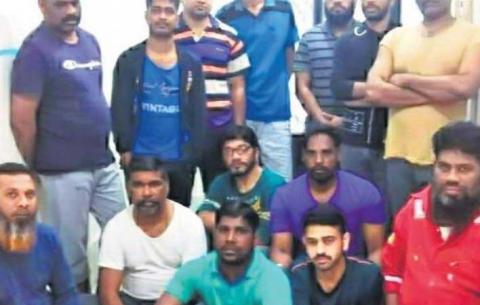Yemen famine: 10 million children facing starvation with suffering 'only likely to get worse'


The war in Yemen is one of the world's most intractable conflicts and its worst humanitarian crisis.
The UN says more than 10,000 people have died in the past 18 months - 100,000 since 2015 - and 80% of its population of 30 million are dependent on aid.
More than 20 million require urgent humanitarian assistance - almost half of them children - and more than three million people have been displaced.
There is little sign of an end to the conflict because it has drawn in the big powers of the region whose rivalry shows no sign of abating.
The roots of the war go back to the Arab Spring uprising. Huge crowds of protesters forced the ousting of longstanding strongman ruler Ali Abdullah Saleh.
The transition to his successor President Mansur Hadi was plagued with problems. Corruption, political infighting and economic failure all strengthened the Houthis, a Shia movement supported by Iran.
The Houthis took over the capital of Sanaa and ousted the Sunni government. Neighbouring Saudi Arabia looked on in alarm at the rise of a group it sees as proxies for Iran, its longstanding enemy. The Saudis began their military intervention.
What had been an internal civil war was transformed into a regional conflict with devastating consequences.
Yemen has become a proxy conflict. Sunni Saudi Arabia and its great Shia enemy Iran have used the war to play out their longstanding rivalry.
While America tried in the past under the Obama administration to play a more even-handed role in treating Saudi Arabia and Iran, the Trump administration has given Saudis their full blown support and Saudi Iranian enmity has only deepened.
Saudi Arabia has been supported by Arab allies, including the UAE and Egypt, and Britain and America who've supplied them with weapons and warplanes and insist they have the right to defend themselves.
They have air superiority, but their offensive from the skies over Yemen has led to enormous numbers of civilian casualties.
Saudis claim the Houthis are armed, trained and supported by Iran. The Iranians are using the conflict to undermine their Sunni rival and neighbour, say their critics.
Their Houthi enemies have been blamed for multiple rocket attacks on targets deep inside Saudi Arabia, including oil refineries and airports, and reaching as far as its capital Riyadh striking military and civilian installations there.
The Saudis have produced plenty of evidence the Houthis are using weaponry that could only have been supplied to them by a more advanced military - drones, guided rockets and unmanned naval weapons.
They insist they have no choice but to defend their borders and to prevent Iran establishing a stronghold on its doorstep.
But the weaponry supplied to them has been used at devastating cost to civilians. Yemen was already one of the poorest nations on Earth.
Coalition air strikes have caused enormous damage to the country's infrastructure worsening already poor sanitation.
Fighting around the country's main port Hodeida has made matters worse. The country has been plagued by famines and outbreaks of disease including cholera.
The statistics are bleak. Save the Children says 12.3 million youngsters need humanitarian assistance, with 10 million facing famine, according to says UNICEF. 24 million people rely on aid.
While fighting has recently increased in intensity, the UN is warning that famine is likely once again.
"Unfortunately, those who are in a position to help," said the UN's chief humanitarian official Mark Lowcock, "and who have a particular responsibility to do so - are mostly choosing not to".
Several donors - including Saudi Arabia, the United Arab Emirates and Kuwait - who have a particular responsibility - have, unlike recent years, given nothing so far to the $2.41bn UN assistance fund, says the United Nations.
The suffering of the people of Yemen seems only to likely to get worse.

Aden — Yemen Airways has announced new updates to its ticket cancellation (VOID) policy, introducing financial penalties on travel agents in…

Geneva – The United States announced that Yemen will not be among the countries benefiting from a new $2 billion funding pledge for United Na…

Paris — The French humanitarian organization Acted announced that it has delivered cash assistance to nearly 89,000 people affected by displa…